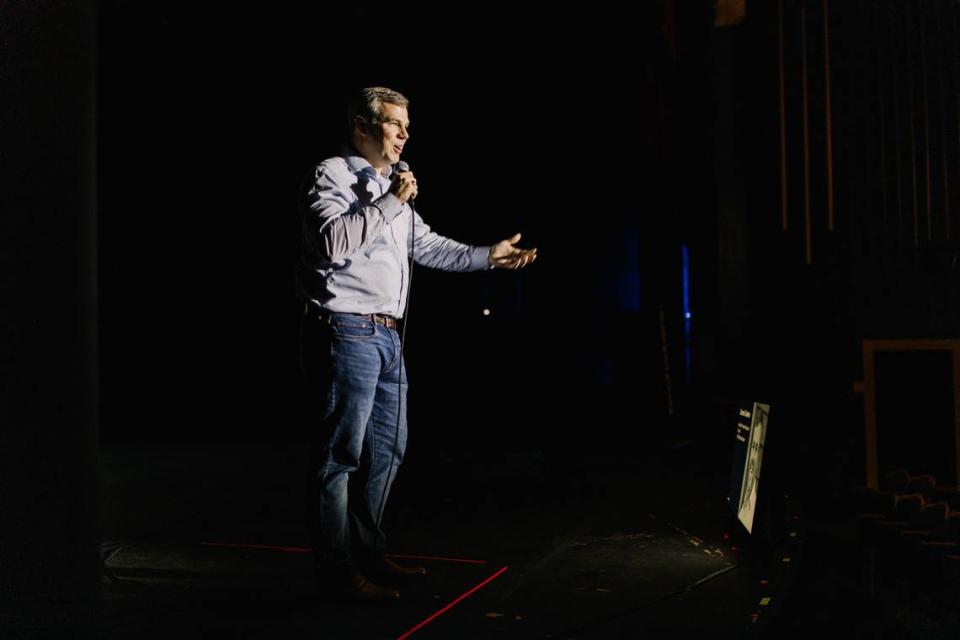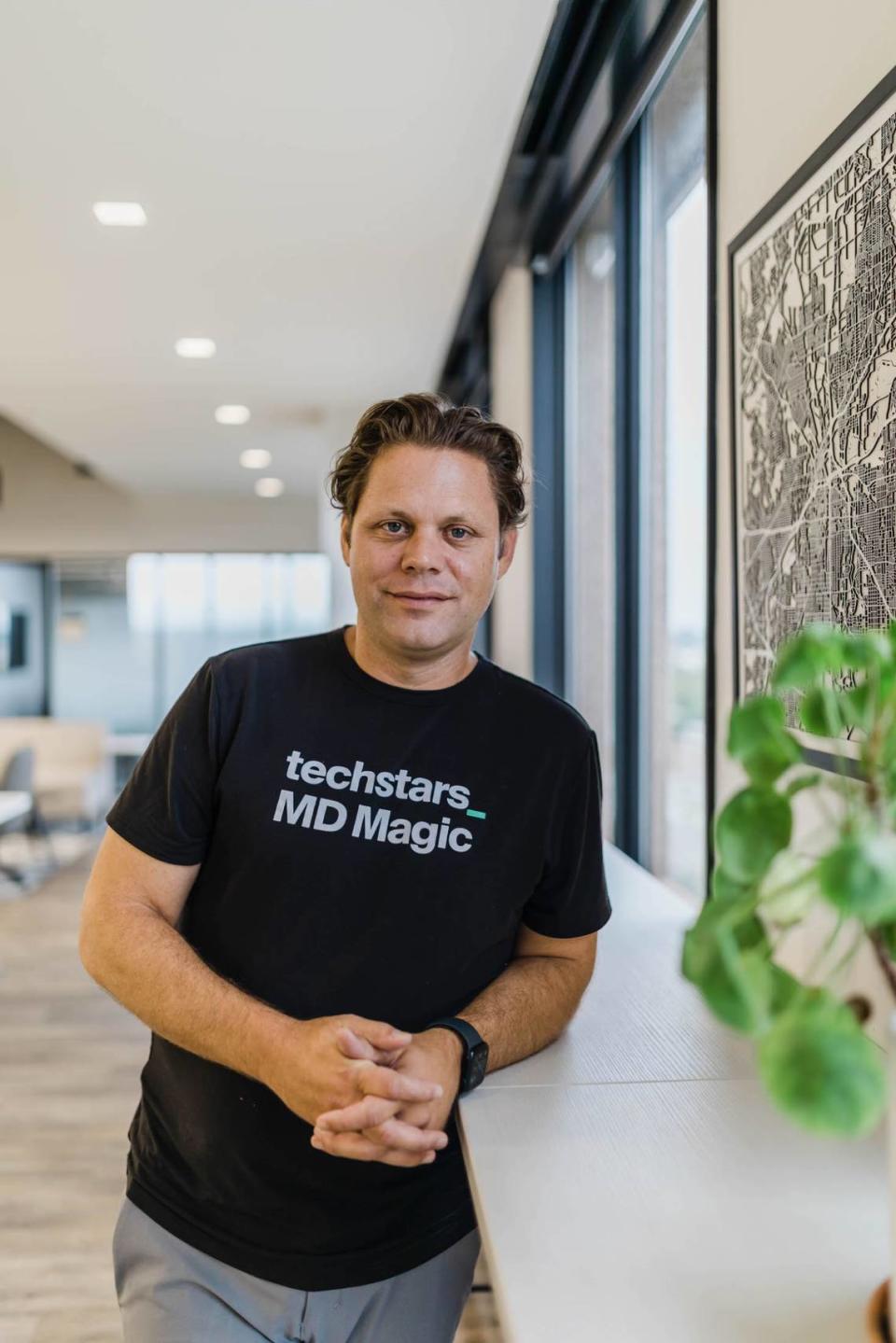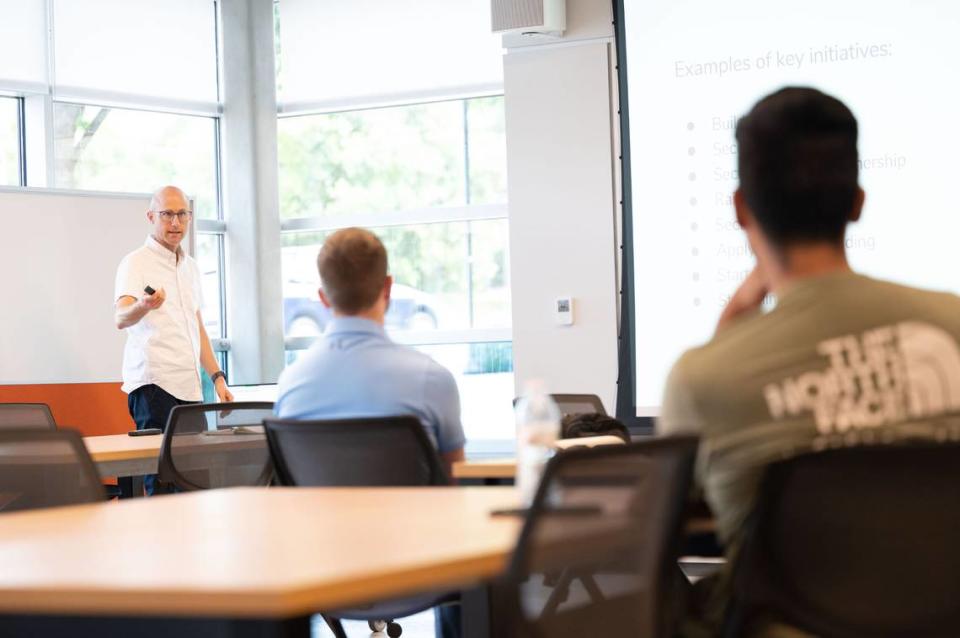Fort Worth is falling behind in venture capital for startups. Here’s why it matters.
When Farukh Aslam bought the Sinclair Building in downtown Fort Worth about 10 years ago, he knew right away he wanted to transform the historic office building into a hotel. The Pakistani American immigrant fell in love with Fort Worth in the 1990s and spent two decades investing in commercial real estate.
Aslam wanted to explore sustainable options for lighting in the hotel. He decided to use low-voltage, direct-current power commonly used in cars, household appliances and electronics.
The Sinclair Hotel was born, and the results were impressive. The building saw 30% savings in power consumption. The technology also allows it to store energy within the building, replacing a traditional diesel backup generator.

The experience prompted Aslam to establish his own startup company, Sinclair Digital, in 2020. He and his team knew they needed funding, so they began looking for investors in Fort Worth. Over six to nine months, Sinclair Digital presented its work to 10 to 15 potential funders.
Nobody bit, Aslam said.
“That’s been the number one challenge,” Aslam said. “Venture capital firms focusing on tech do not look at Fort Worth, or I guess don’t take a startup in Fort Worth very seriously. That’s been a challenge.”
Venture capital is a type of early-stage financing that investors give startups and small businesses that they think have opportunity for long-term growth. It can be very risky, and deals tend to revolve around emerging companies looking for significant funds for the first time.
The challenge Aslam faced is not isolated to his startup. Entrepreneurship and innovation experts across Fort Worth and the larger North Texas region agree: Fort Worth faces a lack of venture capital funds, and it’s a missed opportunity for the city’s growth.

Cameron Cushman is the assistant vice president of innovation ecosystems at the University of North Texas Health Science Center. He said Fort Worth is significantly lagging behind in early-stage investing in comparison to other cities.
Despite being the 13th largest city in the U.S., Fort Worth ranks 40th nationwide in early-stage funding raised, according to data from UNT HSC’s innovation ecosystem dashboard Sparkyard. The estimate for early-stage capital raised in Fort Worth from 2015 to 2020 was $88.4 million, which is closer to Albuquerque, New Mexico, and Bakersfield, California, than to Texas’ other major cities.
“In Fort Worth, we’re very willing to invest in oil and gas and real estate, but much past that we don’t invest in really anything early stage,” Cushman said.
Stay on top of business news in Fort Worth. Sign up for our Building Worth newsletter here
With the Sinclair Hotel being 30% more energy efficient than the hotel across the street, Cushman said, the startup is sitting on major technology to get buildings more energy efficient. He is surprised by the struggle to get funding.
Cushman isn’t the only expert who seems to think the problem could lie in Fort Worth’s culture that has historically prioritized investing in energy and real estate over technology and innovation.
Bryan Chambers, who teaches venture capital at the University of Texas at Dallas, said the generations of wealth that previously built Fort Worth haven’t been focused on technology.
“It’s harder for them to transfer and affiliate,” said Chambers, who is also the president of Capital Factor, an Austin-based co-working space for entrepreneurs. “Their networks are not technology. Their deal flow is not technology. Their comfort zone is not technology. That’s just an inherent reality.”
Chambers said for this to change, there has to be a prioritized embrace of early-stage investing where key stakeholders in the community are willing to reinvest their capital back into technology.
“The very wealthy people that are in town need to be intentional about supporting and growing and investing, because if they are not doing it, other people will not,” Chambers said. “It’s highly unlikely that other people will come from out of town to do it. Now, if they do it, other people will come from out of town to do it. Fundamentally, you need reinvestment in a community.”

Trey Bowles, the managing director of Techstars Physical Health Fort Worth, acknowledged that early-stage funding is exceptionally risky, which doesn’t sound attractive to somebody who has never done it before and doesn’t understand the concept. Techstars, a global investment business that provides capital and mentorship to early-stage entrepreneurs, launched its Fort Worth program in 2022 for opportunities in physical health.
“There’s an unbelievable amount of philanthropic spirit in Fort Worth,” Bowles said. “People see the value of giving, donating and investing in things that help people in Fort Worth and help people in need. We have to connect in the investor’s mind why investing in early-stage is not only a philanthropic thing to do, it’s helping empower, equip and develop entrepreneurship and economic freedom, and generational transformation of wealth.”
Bowles compared investing in early-stage startups to the quote, “Give a man a fish and you feed him for a day. Teach a man to fish and you’ll feed him for a lifetime.”
“That’s what we’re asking people to do here,” Bowles said. “There’s nothing more empowering to those in need than to provide for them the opportunity to do for themselves.”
Bowles said Fort Worth has more than enough money to invest, but it’s a matter of finding investors willing to take on the risk and sacrifice their time during the lengthy process.
Les Kreis, managing partner of Fort Worth-based venture capital investment firm Bios Partners, said he thinks the key to solving the lack of funds involves a city business development agenda that puts technology at the top.
If Fort Worth wants to get serious about venture capital, it will have to get serious about technology, Kreis said.
“The solution is to build for the future, and since I feel so strongly that technology is the future, I think Fort Worth has to start preparing its workforce and business development today,” Kreis said.

Hayden Blackburn is managing director of Tech FW, a nonprofit startup accelerator and business incubator that has helped emerging technology companies grow since 1998. Blackburn said he thinks the solution is creating economic development incentives for local investors to contribute funding to local, high-growth companies earlier in their development.
Blackburn proposed the possibility of a seed fund exclusively for startups operating and headquartered in Fort Worth.
“There will always be those that are driven to solve problems and to take the risk of creating something new,” Blackburn said. “Inspiration follows sparks of innovation, and it makes for an environment where everyone, from the individual citizen to corporate entities, believe they can be a part of creating positive change.”
Bowles, of Techstars Physical Health Fort Worth, said he thinks the real opportunity is at the city level, and the cost to invest in early-stage startups is insignificant compared to the greater economic impact of their potential success.
“If we can continue to focus on pushing our business leaders to find ways to make it a priority, to make it a strategy or pillar of the city and of people of Fort Worth, we can have an ecosystem that is welcoming, that is conducive, that is supportive of entrepreneurs,” Bowles said. “That is going to be the most important component.”

‘We need to have startups’
Why should a venture capital shortage matter to Fort Worth’s business community?
Entrepreneurship experts point toward the wide range of opportunities it can provide, including economic freedom for an individual or family, job creation, attracting young talent, building a more reputable city and recruiting new companies to the region.
“Job growth doesn’t happen at the small-business level or at the corporate level,” Bowles said. “It happens at the hybrid startup level, so we need to have startups.”
Entrepreneurship also creates innovation and disruption, which appeals to talent at early-stage companies and larger corporations, Bowles said.
Experts pointed toward examples in cities like Dallas, Houston, Miami, Atlanta and Nashville. These cities haven’t traditionally symbolized technology and innovation as significantly as Silicon Valley or Austin, but they have nonetheless seen large corporations drawn to their cities in correlation with a stronger surrounding entrepreneurship pipeline.
Bowles recalled his role co-chairing the Dallas Mayor’s Task Force on Innovation and Entrepreneurship. He was frequently called in to talk with corporations looking to move to the Metroplex because they wanted to understand the innovation landscape.
“That was important,” Bowles said. “It was a factor in them determining whether or not they were going to move to the area.”
Beyond the benefit of having a strong entrepreneurship pipeline, the technology that innovators and disruptors are working on every day in Fort Worth also plays a role in building a better community.
In the case of Sinclair Digital, Aslam was unable to find early-stage funding in Fort Worth, so he was forced to look elsewhere. Luckily for his business, Sinclair Digital was able to find its first round of funding near Atlanta, but not all Fort Worth-based startups are as fortunate.

Since then, Sinclair Digital has developed a hotel in New Haven, Connecticut, that generates all its power on site and has plans for hotels in San Francisco and Porto, Portugal. Sinclair Digital is still looking for further funding to expand its research and development and make buildings more sustainable and carbon-neutral.
A larger supply of local funding within Fort Worth could mean more energy efficient hotels and commercial buildings making a positive environmental impact on downtown and reducing the central district’s carbon footprint.
“We have our eyes on a couple of historic buildings in downtown,” Aslam said. “Sinclair to us was version 1.0. We are already up to version 3.0 now.”
Aslam said he thinks local funding is always better, because it helps people invest in their own community.
“I think it builds a better relationship to have your investors in your own town. It allows investors to have a sense of ownership. They feel proud of what they’re creating, especially the kind of work we do.”

 Yahoo Movies
Yahoo Movies 
